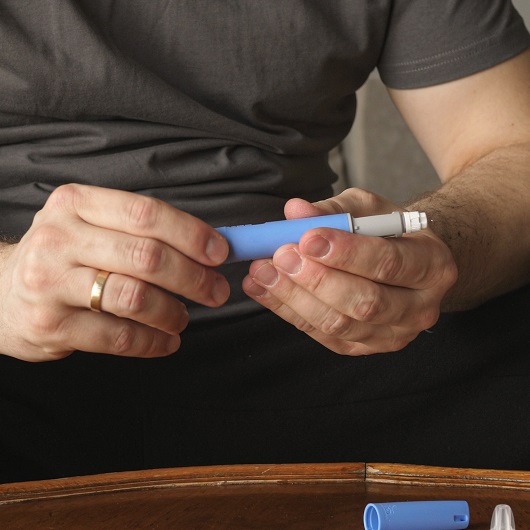Does the 30-30-30 Diet Help With Weight Loss?

August 13, 2024
Updated January 2025
The 30-30-30 diet is a popular weight-loss trend that calls for eating 30 grams of protein within 30 minutes of waking up, followed by 30 minutes of low-intensity exercise. But is the diet and exercise routine the weight-loss answer everyone is looking for?
Our expert, Hans Schmidt, M.D., chief of the Bariatric Surgery division at Hackensack University Medical Center, explains 30-30-30 diet benefits and alternatives.
Protein Promotes Weight Loss
Protein is a key part of the 30-30-30 diet, and it is essential, no matter if you’re trying to lose, gain or maintain your weight. Your body uses protein for many functions, like repairing muscles and bones. Most people should aim to eat 60–80 grams of protein daily.
It takes more energy to digest protein than fat or carbs, so you burn more calories eating it. Protein can also help you feel fuller longer and reduce the urge to snack.
“Protein breaks down more slowly and can help temper blood sugar spikes,” Dr. Schmidt adds. While eating 30 grams of protein first thing in the morning, as the diet suggests, may seem extreme, Dr. Schmidt says it’s just fine for the average person.
However, the source of your protein matters. For example, protein shakes usually have around 30 grams of protein but may be high in carbs and sugars. Instead, try lean proteins, such as:
- Fat-free yogurt
- Lean meat
- Shellfish
- Eggs
- Low-fat cottage cheese
- Legumes, like lentils or beans
Meal Times Won’t Make or Break Your Weight-Loss Goals
While eating protein early in the morning can help fill you up and keep your blood sugar stable, there is no reason to eat within 30 minutes of waking up. “The timing doesn’t offer significant benefits,” says Dr. Schmidt.
Some people with certain health conditions, such as diabetes, may need to eat on a schedule to regulate their blood sugar. For most others, a regular meal routine can help prevent overeating. If you usually eat three meals a day at about the same time, you are less likely to skip a meal and overeat to ease the hunger pains.
Don’t Sweat Exercise Timing for Weight Loss
Many studies have tried to pinpoint the “best” time to exercise, Dr. Schmidt says, “but none of these have proven that such a time exists.” The key is to exercise—no matter what time of day you do it.
The 30-30-30 diet seems to suggest low-intensity exercise is best for weight loss. Some easy low-intensity activities are:
- Walking
- Yoga
- Golf
This type of activity can improve your mood and flexibility, and most people can do it—even if they haven’t worked out in a while. However, the Centers for Disease Control and Prevention recommends at least 150 minutes a week of moderate-intensity exercise and twice-weekly strength training for general health—and more for weight loss.
Moderate-intensity activities get your heart rate about 50 percent higher than at rest. Some examples include:
- Swimming
- Jogging
- Bicycling
- Playing basketball or doubles tennis
The amount and intensity of exercise you need to lose weight will depend on your fitness level and overall goals. Your primary care physician or a weight-loss specialist can help you create a personalized diet and exercise plan.
Is the 30-30-30 Diet Safe and Effective?
“It’s neutral,” Dr. Schmidt says. “There is no harm in doing it, and it may be a helpful tool for some people.” However, this regime is rigid, and it might be difficult for people with early schedules or small children to follow. “The 30-30-30 diet is not magic,” Dr. Schmidt says. “Everybody is looking for a quick fix; unfortunately, it doesn’t exist. Instead, find ways to reduce calories and increase activity that you can stick to.”
To lose weight, your body needs to use more calories than it takes in. Usually, you can strike the right balance of calories in (food) and calories out (exercise) by eating less or eating foods with fewer calories and adding more activity to your routine. Protein and low-intensity exercise can be a part of this equation, but they aren’t the only tools to lose weight.
Weight-Loss Options When You Need Help
For those who have tried to lose weight without success and need to lose 50 pounds or more, bariatric surgery can be a safe and effective option. Multiple benefits of weight-loss surgery make it a good choice for people with obesity:
- High success rates: Most people who undergo weight-loss surgery lose significant weight and keep it off.
- Minimally invasive techniques: Most surgeries have a few small incisions, low rates of complications and quick recovery.
- Covered by insurance: People with obesity can have their surgery covered if they meet specific health criteria.
There are many options out there for losing weight, but Dr. Schmidt emphasizes, “Find the answer that not only helps you lose weight but keep it off because it’s the maintenance that’s hard.”
Next Steps & Resources:
- Meet our source: Hans Schmidt, M.D.
- Schedule an appointment with a bariatric expert or call 800-822-8905.
- Thinking about weight-loss surgery? Take our weight-loss surgery survey.
The material provided through HealthU is intended to be used as general information only and should not replace the advice of your physician. Always consult your physician for individual care.








